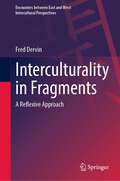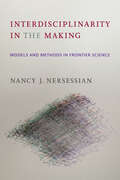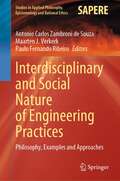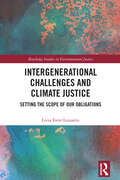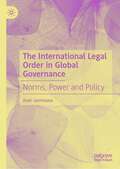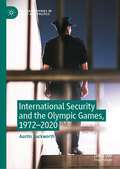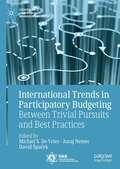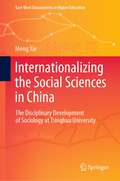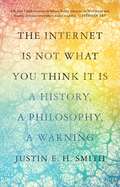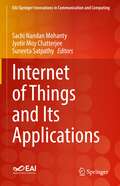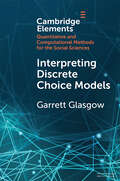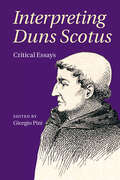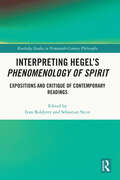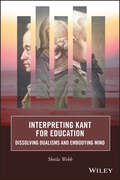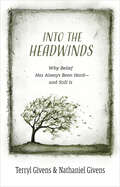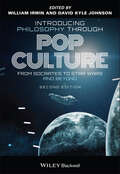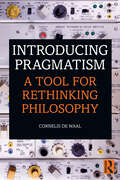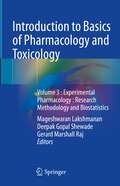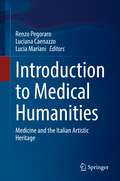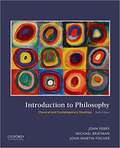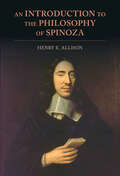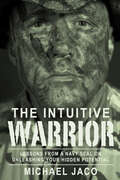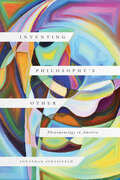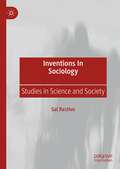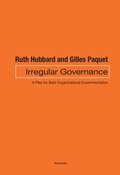- Table View
- List View
Interculturality in Fragments: A Reflexive Approach (Encounters between East and West)
by Fred DervinThis book continues the author’s long-term reflections (over 20 years of scholarship and experience in intercultural communication education) around the fascinating and yet contestable notion of interculturality in education. As an unstable and polysemic notion, interculturality deserves to be opened up again and again and there is a need to engage with it continuously, observing, critiquing and problematizing its complexities. This book urges researchers, students and interculturalists to take the time to think carefully and deeply about interculturality and to find inspiration beyond the dominating ‘Western’ ideological world of intercultural research and education. This book starts from short fragments written by the author for himself over a period of one year. In these short statements and notes about interculturality, the author reflects creatively on the questions he had in mind at the time of writing and offers some (temporary) answers, which, in turn, are questioned and revised. Over the 1000 fragments that the author wrote, he selected about 100, for which he wrote commentaries, referring to and reviewing current research and debates on interculturality in the process. One of the specificities of the book is to be highly multidisciplinary to help us get used to looking for inspiration in other fields of research and creativity. The fragments can be read randomly – the reader may open the book at any page and pick any fragment. The author suggests reading each individual fragment first and then the accompanying explanatory texts. While reading them, the reader is also invited to reflect on any potential addition to what the author wrote – anything they might dis-/agree with, anything they would have wanted to discuss with the author. Questions have been added at the end of each chapter for readers to reflect on and to enrich their own criticality and reflexivity. The book serves as continuous guidance for engaging with interculturality.
Interdisciplinarity in the Making: Models and Methods in Frontier Science
by Nancy J. NersessianA cognitive ethnography of how bioengineering scientists create innovative modeling methods.In this first full-scale, long-term cognitive ethnography by a philosopher of science, Nancy J. Nersessian offers an account of how scientists at the interdisciplinary frontiers of bioengineering create novel problem-solving methods. Bioengineering scientists model complex dynamical biological systems using concepts, methods, materials, and other resources drawn primarily from engineering. They aim to understand these systems sufficiently to control or intervene in them. What Nersessian examines here is how cutting-edge bioengineering scientists integrate the cognitive, social, material, and cultural dimensions of practice. Her findings and conclusions have broad implications for researchers in philosophy, science studies, cognitive science, and interdisciplinary studies, as well as scientists, educators, policy makers, and funding agencies. In studying the epistemic practices of scientists, Nersessian pushes the boundaries of the philosophy of science and cognitive science into areas not ventured before. She recounts a decades-long, wide-ranging, and richly detailed investigation of the innovative interdisciplinary modeling practices of bioengineering researchers in four university laboratories. She argues and demonstrates that the methods of cognitive ethnography and qualitative data analysis, placed in the framework of distributed cognition, provide the tools for a philosophical analysis of how scientific discoveries arise from complex systems in which the cognitive, social, material, and cultural dimensions of problem-solving are integrated into the epistemic practices of scientists. Specifically, she looks at how interdisciplinary environments shape problem-solving. Although Nersessian&’s case material is drawn from the bioengineering sciences, her analytic framework and methodological approach are directly applicable to scientific research in a broader, more general sense, as well.
Interdisciplinary and Social Nature of Engineering Practices: Philosophy, Examples and Approaches (Studies in Applied Philosophy, Epistemology and Rational Ethics #61)
by Paulo Fernando Ribeiro Antonio Carlos Zambroni de Souza Maarten J. VerkerkThis book covers practical and philosophical aspects of Engineering, paying special attention to the social impacts of emerging technologies. Some fundamentals of philosophy of technology are introduced followed by social, economic, and environmental discussion and implications in different disciplines. Each chapter provides insights on the responsibilities involved in the design of engineering projects. The examples presented combine concepts about the impacts of Engineering in society at the same time that incorporates new technological models, yielding an innovative approach about the topics.
Intergenerational Challenges and Climate Justice: Setting the Scope of Our Obligations (Routledge Studies in Environmental Justice)
by Livia Ester LuzzattoClimate change poses questions of intergenerational justice, but some of its features make it difficult to determine whether we have obligations of climate justice to future generations. This book offers a novel argument, justifying the present generation’s obligations to future people. Livia Luzzatto shows that we have intergenerational obligations because many of our actions are based on presuppositions about future people. When agents engage in such intergenerational actions, they acquire an obligation to also recognize those future people as agents within their principles of justice, and with that a duty to respect their agency and autonomy. Intergenerational Challenges and Climate Justice also offers a way to circumvent the problems of non-identity and non-existence. Its approach overcomes the intergenerational challenges of climate change by meeting three necessary criteria: providing ways to cope with uncertainty, dealing with the complexity of climate change, and including future people for their own sake. The author meets these criteria by adopting an action-centered methodology that grounds our obligations of justice on the presuppositions of activity. This robust framework can be used to justify increased climate action and the greater inclusion of future-oriented policies in current decision making. This book will be of great interest to academics and students concerned with the issues of climate and intergenerational justice.
The International Legal Order in Global Governance: Norms, Power and Policy
by Alain GermeauxThe space occupied by international law in shaping political action is subject to continuing debate and controversy. This book aims to answer the question of how and why international law impacts the behaviour of actors on the international stage in the absence of central authority and faced with asymmetric power. At a time when the role of normative restraints in international relations, and international law in particular, has come under renewed questioning, it advances an analytical framework for understanding the effect of norms on behaviour that is not contingent on material restraints or a given political constellation, while being informed by the practical realities and practice of international organisation. In doing so, this book draws on an interdisciplinary range of sources, including international law, political theory, cognitive psychology and behavioural economics to explore a communicative action-based approach of how norms and ideas persuade actors to engage in a course of action consonant with international law to achieve a particular outcome. In probing the role of norms on questions such as the use of force and accountability, and issues of equity and justice, it examines the challenges international law faces and what the way forward may look like.
International Security and the Olympic Games, 1972–2020 (Palgrave Studies in Sport and Politics)
by Austin DuckworthDrawing on new archival documents and interviews, this book demonstrates the evolving role of international politics in Olympic security planning. Olympic security concerns changed forever following the terrorist attack on Israeli athletes at the 1972 Munich Olympic Games. The International Olympic Committee’s (IOC) choice to ignore security after the attack in Munich left individual Olympic Games Organizing Committees to organize, fund, and provide security for the major international event. Future Olympic hosts planned security amidst increasing numbers of international terrorist attacks, and with the Cold War in full swing. For some Olympic hosts, Olympic security now represented their nation’s largest ever military operations. By the time the IOC made security more of a priority in the early 1980s, the trends in Olympic security were set for the future.
International Trends in Participatory Budgeting: Between Trivial Pursuits and Best Practices (Governance and Public Management)
by Michiel S. De Vries Juraj Nemec David ŠpačekThis book analyses the participatory budgeting practice as it has evolved in evaluated countries, focusing on what is substantially at stake concerning the budget and issues involved, the actual participation, the way such processes are organised and administered, and the outcomes of such processes. It concludes that participatory budgeting in selected European countries is far away from the level of ‘best practice’, but that all experiences are not just trivial pursuits. The information collected serves to check, to what extent participatory budgeting as practiced in the countries involved presents a real attempt to change municipal budgets towards addressing the needs of marginalized groups and to improve decision-making based on local democracy and participation, or whether these processes as such are to be judged to be more important than any output and outcomes. The practices can neither be seen as a process of policy diffusion nor as a process of policy mimesis. The terminology of participatory budgeting remains, but the tools to achieve the goals resulted only in marginal changes in the status quo in municipalities in European countries practicing participatory budgeting, instead of resulting in radical changes to increase spending in favor of marginalized groups.Chapter 15 'Unraveled Practices of Participatory Budgeting in European Democracies' is available open access under a CC BY 4.0 license.
Internationalizing the Social Sciences in China: The Disciplinary Development of Sociology at Tsinghua University (East-West Crosscurrents in Higher Education)
by Meng XieThe current social reality and changing global forces and spaces are inspiring the rethinking, refining, and re-empowering of the world social sciences to broach the frontiers of human knowledge, enhance mutual understanding across cultures and civilizations, and shape a better world. Taking Tsinghua University’s sociology as a case, this book concentrates on how internationalization shapes disciplinary development in a global context of asymmetrical academic relations. This inquiry is set amidst China’s dramatic economic, social, political, and cultural transformations, as well as the institutional reforms in this Chinese flagship university. This book seeks to probe how Chinese and Western knowledge, institutions, and cultures are integrated in the ongoing process of internationalization and concentrates on the disciplinary evolution of Tsinghua’s sociology—intellectually, institutionally, and culturally—drawing on top-down higher education policy and bottom-up perceptions and experiences of Tsinghua’s social scientists. This book highlights that higher education internationalization is an evolving process whose advanced phase would require Chinese social scientists to bring China to the world. It is time for Tsinghua University to reassess the long-term impact of internationalization on its academic disciplines and provide sufficient support for the development of the social sciences.This book will attract academics, practitioners, and postgraduate students interested in higher education internationalization, international academic relations, global constellation and distribution of academic power, academic knowledge production, and the development and intellectual influences of the Chinese social sciences.
The Internet Is Not What You Think It Is: A History, a Philosophy, a Warning
by Justin E. SmithAn original deep history of the internet that tells the story of the centuries-old utopian dreams behind it—and explains why they have died todayMany think of the internet as an unprecedented and overwhelmingly positive achievement of modern human technology. But is it? In The Internet Is Not What You Think It Is, Justin Smith offers an original deep history of the internet, from the ancient to the modern world—uncovering its surprising origins in nature and centuries-old dreams of radically improving human life by outsourcing thinking to machines and communicating across vast distances. Yet, despite the internet’s continuing potential, Smith argues, the utopian hopes behind it have finally died today, killed by the harsh realities of social media, the global information economy, and the attention-destroying nature of networked technology.Ranging over centuries of the history and philosophy of science and technology, Smith shows how the “internet” has been with us much longer than we usually think. He draws fascinating connections between internet user experience, artificial intelligence, the invention of the printing press, communication between trees, and the origins of computing in the machine-driven looms of the silk industry. At the same time, he reveals how the internet’s organic structure and development root it in the natural world in unexpected ways that challenge efforts to draw an easy line between technology and nature.Combining the sweep of intellectual history with the incisiveness of philosophy, The Internet Is Not What You Think It Is cuts through our daily digital lives to give a clear-sighted picture of what the internet is, where it came from, and where it might be taking us in the coming decades.
Internet of Things and Its Applications (EAI/Springer Innovations in Communication and Computing)
by Sachi Nandan Mohanty Jyotir Moy Chatterjee Suneeta SatpathyThis book offers a holistic approach to the Internet of Things (IoT) model, covering both the technologies and their applications, focusing on uniquely identifiable objects and their virtual representations in an Internet-like structure. The authors add to the rapid growth in research on IoT communications and networks, confirming the scalability and broad reach of the core concepts. The book is filled with examples of innovative applications and real-world case studies. The authors also address the business, social, and legal aspects of the Internet of Things and explore the critical topics of security and privacy and their challenges for both individuals and organizations. The contributions are from international experts in academia, industry, and research.
Interpreting Discrete Choice Models (Elements in Quantitative and Computational Methods for the Social Sciences)
by Garrett GlasgowIn discrete choice models the relationships between the independent variables and the choice probabilities are nonlinear, depending on both the value of the particular independent variable being interpreted and the values of the other independent variables. Thus, interpreting the magnitude of the effects (the “substantive effects”) of the independent variables on choice behavior requires the use of additional interpretative techniques. Three common techniques for interpretation are described here: first differences, marginal effects and elasticities, and odds ratios. Concepts related to these techniques are also discussed, as well as methods to account for estimation uncertainty. Interpretation of binary logits, ordered logits, multinomial and conditional logits, and mixed discrete choice models such as mixed multinomial logits and random effects logits for panel data are covered in detail. The techniques discussed here are general, and can be applied to other models with discrete dependent variables which are not specifically described here.
Interpreting Duns Scotus: Critical Essays
by Giorgio PiniJohn Duns Scotus is commonly recognized as one of the most original thinkers of medieval philosophy. His influence on subsequent philosophers and theologians is enormous and extends well beyond the limits of the Middle Ages. His thought, however, might be intimidating for the non-initiated, because of the sheer number of topics he touched on and the difficulty of his style. The eleven essays collected here, especially written for this volume by some of the leading scholars in the field, take the reader through various topics, including Duns Scotus's intellectual environment, his argument for the existence of God, and his conceptions of modality, order, causality, freedom, and human nature. This volume provides a reliable point of entrance to the thought of Duns Scotus while giving a snapshot of some of the best research that is now being done on this difficult but intellectually rewarding thinker.
Interpreting Hegel’s Phenomenology of Spirit: Expositions and Critique of Contemporary Readings (Routledge Studies in Nineteenth-Century Philosophy)
by Ivan Boldyrev Sebastian SteinThis book focuses on the interpretations of Hegel’s Phenomenology of Spirit that have proved influential over the past decades. Current readers of Hegel’s Phenomenology face an abundance of interpretive literature devoted to this difficult text and confront a plethora of different philosophical presuppositions, research strategies and hermeneutic efforts.To enable a better orientation within the interpretative landscape, the essays in this volume summarize, contextualize and critically comment on the issues and currents in contemporary Phenomenology scholarship. There is a common set of three questions that each of the contributions seeks to answer: (1) What kind of text is The Phenomenology of Spirit? (2) What do the different strategies of interpretation conceptually bring to the text? (3) How do different interpreters justify their verdict on whether the Phenomenology is still a viable project?
Interpreting Kant for Education: Dissolving Dualisms and Embodying Mind (Journal of Philosophy of Education)
by Sheila WebbINTERPRETING KANT FOR EDUCATION No thinker in the modern world has laid the way for the development of philosophy so influentially as Immanuel Kant, and it is hard to think of the philosophy of education without some sense of Kant in the background. Yet simplified exegeses and synoptic accounts abound, making for a ‘Kantian’ picture that readily succumbs to caricature. Interpreting Kant for Education exposes the errors in this picture. Through a spiralling series of arguments, Sheila Webb dismantles the sclerotic dualisms of fact and value, subject and object, and body and mind that have done so much to hamper appreciation of Kant and to harm education. This ground-breaking work in the philosophy of education allows a reappraisal of Kant; it plays its part in the reengagement with Kant in the wider analytic tradition and provides a secure footing for better research and practice in education.
Into the Headwinds: Why Belief Has Always Been Hard—and Still Is
by Terryl Givens Nathaniel GivensA deeper look at how people individually and collectively form religious beliefs—and what that means for faith in a society of declining religious affiliation. Secularism is increasingly a fact of life in Western society. But that doesn&’t necessarily mean that faith is harder than it has been before. Even in the past when organized religion enjoyed more widespread cultural acceptance, there were still obstacles to true belief. Today, the obstacles are different, but faith is still viable. Acclaimed author Terryl Givens and his son, Nathaniel Givens, combine their respective areas of expertise to offer here a fresh take on religious belief through the lens of contemporary research on psychology, cognition, and human nature. They also address two of faith&’s foremost modern-day antagonists: rationalism—the myth that humans can or should make the majority of their choices based on logical thought—and scientism—the myth that science is the only reliable means of discovering truth. After reckoning with the surprising fact that people often don&’t even understand their own beliefs and are influenced in ways they seldom perceive, the authors go on to describe genuine faith as an act of will—an effortful response to the deepest yearnings of the mind and heart—that engenders moral responsibility, the ability to embrace uncertainty, the motivation and means to relate to others, and the capacity to apprehend reality through nonrational means. Written for truth seekers who may or may not belong to religious communities, Into the Headwinds is less a work of apologetics than an inquiry into the role that faith can and does still play in a society where participation in institutional religion is declining precipitously. Terryl and Nathaniel Givens propose that to reclaim the power of genuine faith—that which can truly offer a way of living against the grain—we need to first acknowledge the reality that religious belief is hard. It always has been, and it always will be. But perhaps, instead of a hindrance, that is its most important aspect.
Introducing Philosophy Through Pop Culture: From Socrates to Star Wars and Beyond
by William Irwin David Kyle JohnsonCan Wonder Woman help us understand feminist philosophy? How Does Wakandan technology transcend anti-Blackness? What can Star Trek teach us about the true nature of reality? Introducing Philosophy Through Pop Culture makes important philosophical concepts and the work of major philosophers relevant, fun, and exciting. Using engaging examples from film and television, this easy-to-read book covers everything from basic metaphysics and epistemology to abstract and complex philosophical ideas about ethics and the meaning of life. You don’t have to be a pop culture expert to benefit from this book—even a general awareness of cultural icons like Superman or Harry Potter will be more than enough for you to learn about a wide range of philosophical notions, thinkers, and movements. The expanded second edition offers timely coverage of important topics such as race, gender, personal identity, social justice, and environmental ethics. New essays explore the philosophical underpinnings of The Good Place, Game of Thrones, Black Panther, Star Wars, The Avengers, South Park, The Lego Movie, The Big Bang Theory, and more. This edition is supported by a new website with links to primary philosophical texts, information about all the popular culture discussed, and additional resources for teachers, students, and general readers alike. Features a selection of key essays from the bestselling Blackwell Philosophy and Pop Culture Series Draws on examples from popular media including The Matrix, Lost, Doctor Strange, The Hobbit, Westworld, and Star Trek Explains philosophical concepts such as relativism, skepticism, existentialist ethics, logic, social contract theory, utilitarianism, and mind-body dualism Discusses the ideas of Socrates, Aristotle, Plato, Descartes, Nietzsche, Heidegger, Marx, Mill, Kierkegaard, and other important thinkers Introducing Philosophy Through Pop Culture is an excellent supplementary textbook for introductory philos for introductory philosophy courses and a valuable resource for general readers wanting to learn about philosophy and its connections with pop culture.
Introducing Pragmatism: A Tool for Rethinking Philosophy
by Cornelis de WaalThis unique introduction fully engages and clearly explains pragmatism, an approach to knowledge and philosophy that rejects outmoded conceptions of objectivity while avoiding relativism and subjectivism. It follows pragmatism’s focus on the process of inquiry rather than on abstract justifications meant to appease the skeptic. According to pragmatists, getting to know the world is a creative human enterprise, wherein we fashion our concepts in terms of how they affect us practically, including in future inquiry. This book fully illuminates that enterprise and the resulting radical rethinking of basic philosophical conceptions like truth, reality, and reason. Author Cornelis de Waal helps the reader recognize, understand, and assess classical and current pragmatist contributions—from Charles S. Peirce to Cornel West—evaluate existing views from a pragmatist angle, formulate pragmatist critiques, and develop a pragmatist viewpoint on a specific issue. The book discusses: Classical pragmatists, including Peirce, James, Dewey, and Addams; Contemporary figures, including Rorty, Putnam, Haack, and West; Connections with other twentieth-century approaches, including phenomenology, critical theory, and logical positivism; Peirce’s pragmatic maxim and its relation to James’s Will to Believe; Applications to philosophy of law, feminism, and issues of race and racism.
Introduction to Basics of Pharmacology and Toxicology: Volume 3 : Experimental Pharmacology : Research Methodology and Biostatistics
by Gerard Marshall Raj Mageshwaran Lakshmanan Deepak Gopal ShewadeThis volume is designed to impart the fundamental concepts in experimental pharmacology, research methodology and biostatistics. Through this book, the readers will learn about different methods involved in drug discovery, experimental animals and their care, equipments and the various bioassays used in experimental pharmacology. This book contains special sections on various drug screening methods involved in the evaluation of different body systems. Certain sections provide the healthcare professionals with the knowledge necessary to interpret clinical research articles, design clinical studies, and learn essential concepts in biostatistics in an expedient and concise manner. Basic principles and applications of simple analytical methods employed in drug analysis are well written under one section. It focuses on the basic and advanced laboratory techniques and also on computer simulated data, written extensively under the Biostatistics section. The methods used for drug analysis have been described in adequate detail with cross-references for further studies and comprehension. Overall, the book is designed systematically with four broad sections with extensive subdivisions for easy tracking, interpretation, and understanding.
Introduction to Medical Humanities: Medicine and the Italian Artistic Heritage
by Renzo Pegoraro Luciana Caenazzo Lucia MarianiThis book proposes an integrated and interdisciplinary approach recording and interpreting the human experience of illness, disability, care, and medical intervention. In our age of deeply technologically-driven medicine, it is crucial to re-establish and promote the neglected relationship between medicine and the arts. This textbook contains contributions by scholars in various fields, who offer their qualified insights in order to reflect on illness, medicine, and the role of physicians and nurses. All chapters overcome a reductive conception of a medicine that is only able to biologically explain illness.All three editors of this book are researchers in Padua, a city that has been described as the cradle of modern medicine. From Gabriele Falloppio to Girolamo Fabrici d’Acquapendente and Giovanni Battista Morgagni, human, normal and pathological, anatomy has taken big steps forward. Galileo Galilei taught for eighteen years at the University of Padua and developed the scientific method there. During the same period, Padua was also the “nursery of arts”, as Shakespeare wrote. In fact, Padua developed, especially in the XIV, XV, and XVI centuries, an impressive and unique artistic culture thanks to artists such as Giotto, Donatello and Titian. Finally, the city of Saint Anthony is a place where a religious feeling strongly oriented towards charity is deeply rooted and strictly linking its history to that of its hospital. For all these reasons a combination of medical humanities and Italian artistic heritage is of interest to anyone involved in bioethics and medicine. This textbook is a unique resource for students of medicine, nursing, bioethics, psychology, theology, and history of art.
Introduction to Philosophy
by John Perry Michael Bratman John Martin FischerIntroduction to Philosophy: Classical and Contemporary Readings is the most comprehensive topically organized collection of classical and contemporary philosophy available. Ideal for introductory philosophy courses, the text offers a broad range of readings and depth. The text includes sections on God and Evil, Knowledge and Reality, the Philosophy of Science, the Mind/Body problem, Freedom of Will, Consciousness, Ethics, Political Philosophy, Existential Issues, and philosophical Puzzles and Paradoxes. (The unique section on Puzzles and Paradoxes is often praised by both instructors and students.) <p><p> Easy to use for both students and instructors alike, the book incorporates boldfaced key terms (listed after each reading and defined in the glossary); a guide to writing philosophy papers; and a “Logical Toolkit;” and study questions after each reading selection. These features have allowed more students to learn philosophy by using what is seen as the highest quality collection of philosophical readings available. The ninth edition will be revised based on reviewer suggestions, and will include more diversity and readings by female philosophers.
An Introduction to the Philosophy of Spinoza
by Henry E. AllisonAimed at those new to studying Spinoza, this book provides a comprehensive introduction to his thought, placing it in its historical and philosophical contexts, and assessing its critical reception. In addition to providing an analysis of Spinoza's metaphysical, epistemological, psychological, and ethical views in the Ethics, Henry Allison also explores his political theory and revolutionary views on the Bible, as well as his account of Judaism, which led to the excommunication of the young Spinoza from the Jewish community in Amsterdam. Although the book's main focus is on the analysis of Spinoza's views, including a close reading of the central arguments of the Ethics, it also considers many of the standard objections to these arguments as well as possible responses to them. This completely revised and updated new edition of Allison's classic book, with two new chapters, will help a new generation of students to understand and value Spinoza's work.
The Intuitive Warrior: Lessons From A Navy SEAL On Unleashing Your Hidden Potential (Intuitive Warrior #1)
by Michael JacoFrom conflicts in Panama to the wars in Iraq and Afghanistan, Navy SEAL Michael Jaco has employed his powers of perception and awareness to save his own life and those of his fellow SEALs. In The Intuitive Warrior, Michael Jaco recounts the mentally and physically demanding training required of members of one of the most elite Special Forces units, the SEAL Team Six, and how the intuition developed during that training can be learned and applied by anyone.
Inventing Philosophy's Other: Phenomenology in America
by Jonathan StrassfeldThe history of phenomenology, and its absence, in American philosophy. Phenomenology and so-called “continental philosophy” receive scant attention in most American philosophy departments, despite their foundational influence on intellectual movements such as existentialism, post-structuralism, and deconstruction. In Inventing Philosophy’s Other, Jonathan Strassfeld explores this absence, revealing how everyday institutional practices played a determinative role in the development of twentieth-century academic discourse. Conventional wisdom holds that phenomenology’s absence from the philosophical mainstream in the United States reflects its obscurity or even irrelevance to America’s philosophical traditions. Strassfeld refutes this story as he traces phenomenology’s reception in America, delivering the first systematic historical study of the movement in the United States. He examines the lives and works of Marjorie Grene, Alfred Schütz, Hubert Dreyfus, and Iris Marion Young, among others, while also providing a fresh introduction to phenomenological philosophy.
Inventions in Sociology: Studies in Science and Society
by Sal RestivoThis book presents a collection of old and new essays exploring the author’s unique contributions to the sociology of science, mathematics, logic, robotics, brain, and god. Known for his defense of a strong social constructionist approach to the hard problems in the sociology of science, the power and range of Restivo’s interests and studies are discussed in this unique text. The essays range from his introduction of the sociology of objectivity early in his career to his recent construction of a social brain paradigm. The author situates himself in the context of the leading paradigms in science studies and his relationships with leading figures in the field including Latour, Woolgar, Needham, and D.T. Campbell. The book demonstrates a general theoretical focus on the rejection of transcendence. He rejects Platonism in mathematics and socially situates consciousness, genius, and God. The author’s wide ranging interdisciplinary competencies reflect classical and postmodern influences and will be an invaluable reference for researchers working in this field.
Irregular Governance: A Plea for Bold Organizational Experimentation
by Hubbard Gilles PaquetA Plea for Bold Organizational Experimentation. The eighth book in the Collaborative Metagovernance series is an irreverent challenge to administrative conservatorship, and a case for bold organizational experimentation. It makes the case for effective new actors, new structural forms and new social technologies, while showing the perils of ill-conceived contraptions like super-bureaucracies, single-purpose agencies and failure to pay due attention to good management. This series of books is designed to define cumulatively the contours of collaborative decentered metagovernance. At this time, there is still no canonical version of this paradigm: it is en émergence. This series intends to be one of many construction sites to experiment with various dimensions of an effective and practical version of this new approach. Metagovernance is the art of combining different forms or styles of governance, experimented with in the private, public and social sectors, to ensure effective coordination when power, resources and information are widely distributed, and the governing is of necessity decentred and collaborative.
